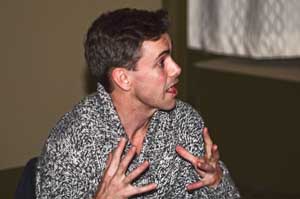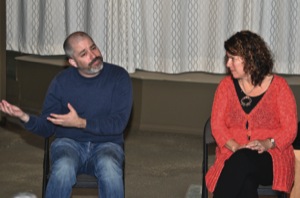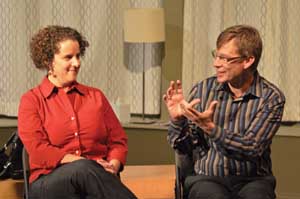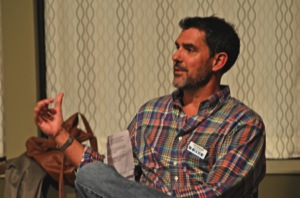
Following the performance of Next Fall Thursday, March 8, the Diversionary Theatre brought together a panel representing different faiths to discuss the issues of faith, religion and belief that were raised in the play and how those touchstones shape our lives. Participating were:
Rabbi Laurie Coskey, executive director of the Interfaith Committee for Worker Justice of San Diego County, whose work focuses on mobilizing people of faith on issues that sustain the life and dignity of workers. Jeanne Burke, a Buddhist chaplain at a local San Diego hospice helping people deal with end-of-life issues, and a certified mindfulness instructor. Rev. Dan Koeshall, senior pastor since 2008 of The Metropolitan Community Church, an open and affirming congregation reaching out particularly to the LGBT community.
Their diverse spiritual paths still permitted the play to resonate with them all, and each related in starkly similar ways to the characters and situations. The discussion, moderated by John Alexander, executive director of the Diversionary Theatre, was guided, yet informal and free-flowing, so not every panelist responded directly to each question.
John Alexander: The play dealt with people with pre-conceived ideas of each other’s views and where they’re coming from. Have you experienced that in your lives and work?
All of the panelists readily agreed they have encountered pre-conceived notions about their faith and certainly their roles.
Jeanne Burke: I have faced expectations people have that all Buddhists are men and about chaplains all being Christian. The role of a chaplain is to meet people where they are, whatever that may be. The play addressed many things I have encountered in belief systems.
Luke’s views are rather black-and-white. How do you deal with the more conservative people?

Rabbi Coskey: I don’t talk theology but talk issues, especially in my focus on worker justice. I am reformed and progressive. I marry Jews and non-Jews. I’ve done commitment ceremonies for same-sex couples. We see what is divine in each other, even with our differences. We acknowledge that we touch each other.
Director James Vasquez: It’s a play not so much about religion but how people relate and connect. The characters, even though some know each other, start without an inter-connection but are all brought together.
How does organized religion help in creating family?
Rev. Koeshall: We have our family of origin and family of choice, and for so many of us, the latter forms a net we create. Religion touches our spiritual aspect wherein lies the bond of personal connection. As we saw with Luke and others, though, God and Christianity are not really so black-and-white. Perhaps that’s why the characters were so believable.
How do you create beliefs that provide grounding versus religious traditions?
Rabbi Coskey: Acceptance is the key. People have a lot of pain to work through. I have seen it in experiences people have shared with me, where they have been hurt [by religion].
How did you feel the play addressed beliefs and issues like end of life?

Jeanne Burke : The play was so real in speaking to what people struggle with, real life issues, the balance between hope and fear.
Rev. Koeshall: One moment that really struck me was Adam saying to Luke, ‘I want you to love me more than Him.’ I thought that was an unfair request. I saw a struggle for the couple, and it pointed out the need to have more mutual respect and to try to not force beliefs on each other.
Rabbi Coskey: It was telling that Luke found the love of his life despite his faith. It showed that relationships really are complex.
The actors participated in the conversation and shared that they drew upon their own life experiences for their characters. It was agreed that there was a cost to the characters, especially Luke and Adam, in holding on to their beliefs. The humor in the play was also noted.
James Vasquez: Life is funny. We need to be able to laugh at ourselves and one another. Without it, people could fall into the heavy-handedness of the characters. They are all written as flawed characters, each coming from a place of not understanding. A goal [of the play] is to make people think, question. But the humor prevented it from being too heavy, like it is preaching.
Audience question: To which character did you most personally relate – and how and why?
Jeanne Burke: I related to Adam. Earlier in my life I felt religion had no role for me, but I experienced some real awakenings, as he did.

Rabbi Coskey: Wow. I think I related to a piece of everyone, I was there with everyone.
Rev. Koeshall: For me it was a progression through the characters. At first I related to Luke. Then in the middle to one of the friends and finally to Adam who was struggling [with what he believed].
As the panel concluded, it was obvious that they, as well as the audience, had been deeply touched by both the story and the characters. Thursday March 15, the Diversionary Theatre brings together still another panel of varied faith backgrounds for another thoughtful discussion. For more information go to diversionary.org or call the theatre at 619-220-0097.










